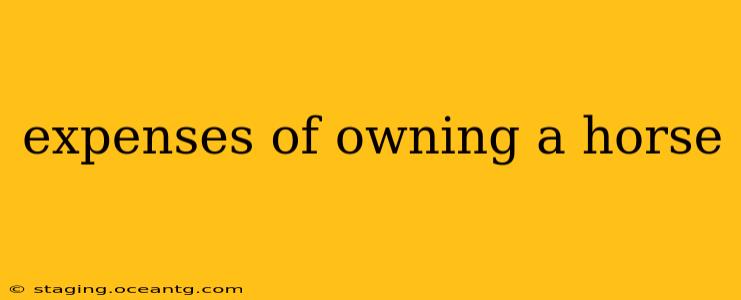Owning a horse is a deeply rewarding experience, offering companionship, adventure, and a unique connection with nature. However, it's crucial to understand that the costs extend far beyond the initial purchase price. Many prospective horse owners underestimate the ongoing expenses, leading to financial strain and, in some cases, even the heartbreaking necessity of rehoming their beloved animal. This comprehensive guide will delve into the various costs associated with horse ownership, helping you create a realistic budget and ensuring a financially sound and fulfilling partnership with your equine friend.
What are the upfront costs of buying a horse?
The initial investment is just the tip of the iceberg. Before you even bring your horse home, you'll face several expenses. These include:
- Purchase Price: This varies wildly depending on the breed, age, training, and bloodlines of the horse. A young, untrained horse might cost a few thousand dollars, while a seasoned show horse can run into the tens or even hundreds of thousands.
- Veterinary Examination: A pre-purchase veterinary exam is essential to identify any underlying health issues. This can cost several hundred dollars.
- Transportation: Getting your horse home safely requires transportation costs, which can range from several hundred to over a thousand dollars, depending on distance.
- Initial Equipment: You'll need basic tack (saddle, bridle, etc.), grooming supplies, and possibly other equipment, adding another several hundred dollars to your initial outlay.
What are the ongoing costs of owning a horse?
The ongoing expenses are where many underestimate the true cost of horse ownership. These costs can be divided into several categories:
1. Boarding:
This is often the largest recurring expense. Boarding costs vary widely depending on location, facilities offered (e.g., stall, pasture board, full-service boarding), and the quality of care. Expect to pay anywhere from a few hundred to over a thousand dollars per month.
2. Veterinary Care:
Regular check-ups, vaccinations, dental care, and potential emergency treatments are essential. These costs can add up quickly, easily reaching several thousand dollars annually.
3. Farrier:
Horses need their hooves trimmed and shod regularly by a farrier. The frequency depends on the horse's hoof growth and activity level. Expect costs of between $50-$150 per visit every 6-8 weeks.
4. Feed and Supplements:
The cost of feed varies greatly depending on the type of feed, the horse's size and activity level, and the quality of the feed. Supplements can also add to this expense. Plan on several hundred dollars per month for feed alone.
5. Insurance:
Equine insurance can help protect you financially in case of illness, injury, or even death. Premiums vary widely based on the horse's value and coverage.
6. Training and Lessons:
If you're not an experienced rider, you'll likely need professional training or riding lessons, adding to the overall cost.
7. Miscellaneous Expenses:
These include things like grooming supplies, fly spray, deworming medication, blankets, repairs to tack, and transportation costs to and from shows or events. This can easily amount to several hundred dollars a month.
How much does it cost to own a horse per year?
The total annual cost of owning a horse can range from several thousand to tens of thousands of dollars, depending on the factors mentioned above. A realistic estimate for basic care in many areas would be between $5,000 and $10,000 annually, but this can easily increase depending on the horse's needs and your chosen level of care and activities.
What are the hidden costs of horse ownership?
Many unexpected costs can arise. These often include:
- Emergency Veterinary Care: Unexpected illnesses or injuries can lead to substantial veterinary bills. Always have a financial reserve for such events.
- Unexpected repairs or replacements: Tack and equipment can break or wear out, requiring unexpected expenses for repairs or replacements.
- Transportation costs to the vet: Emergencies might need transport to a specialist, incurring significant costs.
- Competition fees and travel: If you plan on competing, factor in entry fees and travel expenses.
Is horse ownership worth the cost?
The financial commitment of horse ownership is substantial. However, for many, the rewards far outweigh the costs. The companionship, the physical and mental benefits of riding and caring for a horse, and the unique bond you develop are invaluable. Careful planning, budgeting, and realistic expectations are key to ensuring a financially sound and fulfilling horse ownership experience. Weighing the costs against the personal benefits is a crucial step before making this significant commitment.
